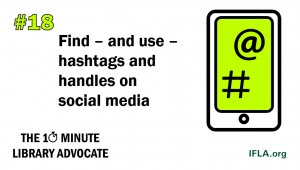Studies of human behaviour are often characterised by a distinction between idealism and realism, between emotion and logic, or between the heart and the head.
Some decisions and actions we see as being driven by instinct, optimism or by a broader sense of values, while others seem to come down to cold, hard rationality.
A Nobel Prize for Economics went to Daniel Kahneman for his work on the difference between choices made rapidly, based on feelings, and those made after deep consideration.
International relations also traditionally differentiates between realists (who argue that countries follow their own interests and use their power freely) and idealism (who argue that states promote their domestic values in their international activities).
How does this relate to library advocacy?
Previous blogs, notably in partnership with OCLC’s WebJunction, have explored the idea of how a range of individual strengths (described as personality types) can come together in order to make for effective advocacy.
At a simpler level, however, we can see library advocacy as requiring a combination of idealism and realism in order to achieve its goals. In other words – as set out in the title of this blog – we need both dreamers and schemers in order to succeed.
Why we need dreamers?
Idealism remains a powerful motivator of action. Fortunately, libraries tend to have this in abundance!
Our institutions are strongly based on values – the importance of equitable access to information, of service to all, of safeguarding heritage for the future, all without the motivation of profit or private gain.
Where these values – and the budgets needed to deliver on them – have been challenged, libraries have become stronger and stronger in defending them.
We have produced communications materials, brought together stories and examples of how libraries contribute to development and other community goals, and build networks of friends and supporters.
Work based on idealism helps to create a positive feeling around libraries, raising interest among decision-makers and voters alike. Even in less democratic systems, those in power often rely on the support of the people for legitimacy, and so will care about what they feel.
Done effectively, it also helps make the step from sympathy to active support among – something that is crucial if libraries are to benefit from the funding and laws they need.
Why we need schemers?
However, idealism does not always solve everything. The fact of acting in the public interest, or delivering on well acknowledged values, is not necessarily enough to bring about adequate funding or favourable reforms to libraries. Understandably, this can be disheartening.
However, we can respond by complementing idealism with a dose of realpolitik. We need to be both dreamers and schemers.
Sometimes, it’s a question of knowing where, when, how, and to whom to make your points most effectively.
For example, a campaign in favour of libraries in the months before a key decision is taken is clearly more useful than one just after.
The answer is to build up your understanding of how decisions are taken, and ideally your relationships with key people involved in the process. If you look, you may well find someone who feels warmly about libraries, and so who can help you. In turn, their advice and insights can help you increase the impact of your work.
There is also the reality that decisions to support additional funding, or favourable laws for libraries, are not always simple. There can be opposition, for example from those resistant to spending in general, other potential beneficiaries of money, or those who feel that better laws for libraries will disadvantage them.
This opposition can be based on values, or simply on concern about profit margins. It is important to think about the arguments that can be made against stronger support for libraires, and how you can counter these.
Of course, in doing so, it is usually best to avoid looking like you do not care about the views of others. Decision-makers often want to avoid ‘picking sides’ in order not to lose support. However, you can usually make progress by showing that supporting libraries brings benefits for all.
As highlighted earlier in this blog, libraries are often already strong when it comes to being ‘dreamers’. We know that our work is based on values, service, and the wider public interest, and are becoming better and better at articulating this.
A key area of development is therefore around how also to become ‘schemers’ – how to understand the processes that lead to decisions being taken about libraries, and how to influence them most effectively.
This is far from the world of pure private lobbying, centred on how to maximise profits for a particular sector (or its shareholders). Throughout libraries’ engagement in decision-making, our values can and should shine through – this is what sets us apart.
In short, we need both to be dreamers and schemers in order to make the best and most effective case for libraries into the future.
 Advocacy is about getting attention.
Advocacy is about getting attention.